By Harold C. Ford
‘Writing is the painting of the voice.” …Voltaire
The latest iteration of a local festival that elevates the literary arts displayed the depth and diversity of Flint-based writers Sept. 13-14. This year, its third, the event premiered a new name, date, location, and talent.
Formerly the Flint Literary Festival, the Flint Festival of Writers featured a program of talented Flint writers at the Ferris Wheel building in downtown Flint. Flint-born LaTashia Perry, whose children’s books have sold more than 60,000 copies since 2015, was “featured reader” at the event.
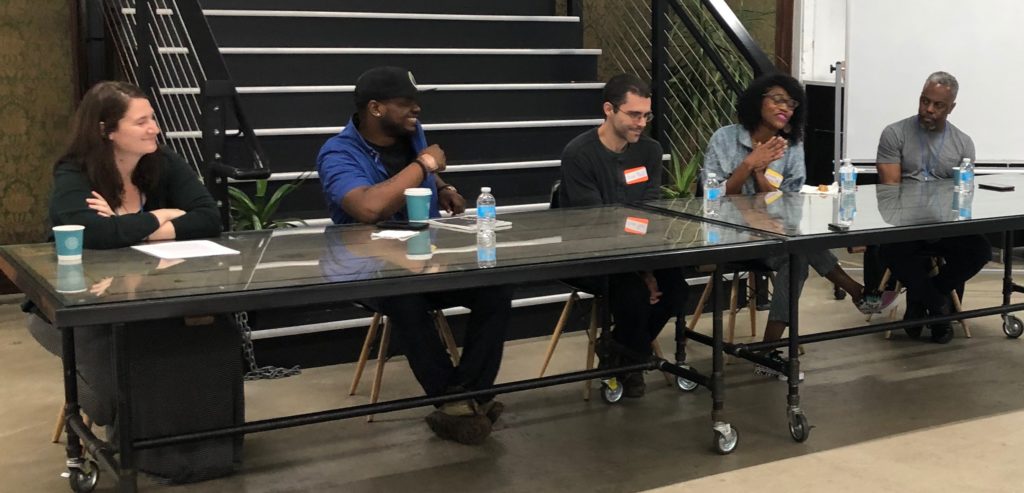
“What I Wish I Knew” panel opening the Flint Festival of Writers Sept. 14. From left, moderator Sarah Carson, Jonah Mixon-Webster, Ben Pauli, LaTashia Perry, Bob Campbell (Photo by Jan Worth-Nelson)
What I Wish I Knew:
The festival’s first Saturday event—a panel discussion titled “What I Wish I Knew”—featured four Flint-based writers who reflected on their literary journeys for an audience of about 30.
The panel included Perry, author of six children’s books; Jonah Mixon-Webster, author of Stereo(TYPE), a gritty award-winning book of poetry, prose, and essays; Bob Campbell, a journalist with stints at East Village Magazine, The Flint Journal, Detroit Free Press, and other publications; and Ben Pauli, the panel’s newest Flint resident, who recently authored a personal, historical, and sociological reflection on Flint’s water crisis, Flint Fights Back, Environmental Justice and Democracy in the Flint Water Crisis.
[While this review focuses on the four aforementioned writers and three events they participated in, the festival also featured award-winning and much-published fiction writer and essayist Kelsey Ronan, a Flint native who presented a workshop on “Writing Our Stories: A Nonfiction Workshop,” and a broadside-making workshop with Elizabeth O’Connell-Thompson. )
The festival also featured a kickoff party Friday night, a book fair, and an open mic celebration Saturday night at Totem Books–Ed.]
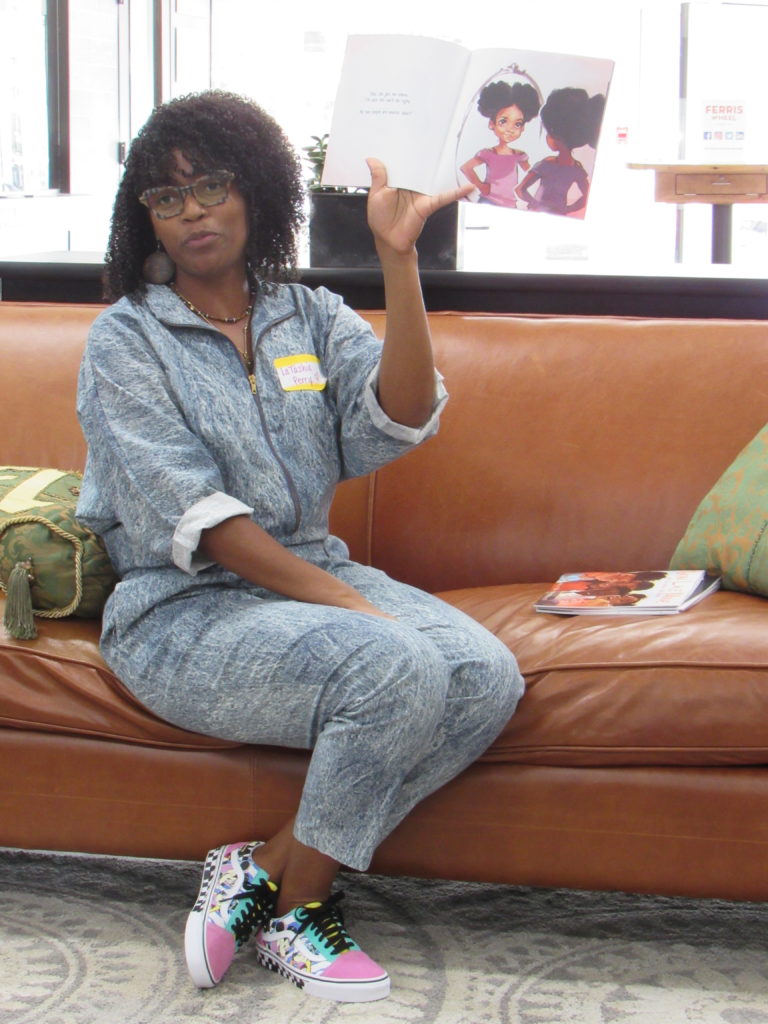
LaTashia Perry, talking about and reading from one of her books at the Flint Festival of Writers (Photo by Harold C. Ford)
LaTashia Perry
“Don’t allow fear to dominate you,” advised Perry, a graduate of Flint’s Southwestern Academy. “Don’t be afraid to be different and unique.”
It was the relative uniqueness of her eldest daughter’s African-American hairstyle in a ballet class that inspired her first book. When her daughter reported being teased about her hair, Perry searched the library for a children’s book about diversity but, alas, could not find one that suited her needs. So she wrote one, Hair Like Mine.
Then Perry’s second daughter began asking about the different skin tones among her family members. That inspired Perry’s second book, Skin Like Mine, whose message is surely intended for her daughter and children everywhere: “Skin like mine is quite divine. In fact, I’d say it’s one of a kind.”
Four more books followed from Perry, who prefers pen and paper to computer keyboards. “I’m old school; I like paper,” she said. “I need to write that stuff down.”
Perry told student panelists Jay McDowell, a 9th grader at Grand Blanc High School, and Evynne Ye, a 6th grader at Grand Blanc Middle School, that the favorite of her six published books is Imagination Like Mine. She read her favorite passage:
“Imagination like mine runs wild and free. But of all the things I could pretend to be, there’s not a thing that’s quite like me.”
“It’s the message I want kids to have,” Perry said. “The little girl in it is me.”
Bob Campbell
“I thought I would have to know a lot,” Campbell said, “but part of the fun and excitement is learning as you go.” For Campbell, that includes fleshing out characters that are “completely unlike myself in terms of gender and race.”
Campbell recognized a predilection for writing at Flint’s Southwestern High School (now called Southwestern Academy) where he preferred tests that featured essay-type questions. “I always preferred essay questions…in part because I always thought I could BS my way through,” he recalled.
After graduation from high school, Campbell headed to an area auto factory, an employment path oh-so familiar to generations of Flintstones. He became an apprentice electrician at AC Spark Plug on the east side of Flint.
Disenchanted with work life in the factory, Campbell began to dabble in journalism. He got his start at East Village Magazine where EVM’s founder Gary Custer took him under his wing. “I learned journalism the same way I learned to become an electrician,” he recollected, “by being an apprentice.”
In pursuing his passion for writing, Campbell said he heeded the advice of Ernest Hemingway who said, “The best way to become a writer was to become a journalist because you have to write every day.”
Nonetheless, the day-to-day stress of journalism served as the catalyst for his transition to creative writing. “I was exhausted by the daily grind of journalism,” he admitted. Now the senior communications manager at the Flint Chamber of Commerce, Campbell still has made time to write creatively. His debut novel, Motown Man, is coming out soon from @UFarmhouse Press.
Ben Pauli
Pauli urged festival participants to get to the creative process of writing by shoving aside avoidance behaviors. “I didn’t particularly want to write a book,” he admitted. “I woke up most days rueing the fact that I had decided to write a book.”
But write a book he did. Flint Fights Back, Environmental Justice and Democracy in the Flint Water Crisiswas published by MIT Press in 2019. [Flint Fights Back was reviewed in the June 2019 issue of East Village Magazine–Ed.]
“In some sense I was the right person to write this particular book,” Pauli said, “You’ve gotta’ decide what makes me the person to do this piece.”
Pauli moved to Flint for a faculty position as assistant professor of social science at Kettering University with his wife and three-year-old son in June 2015, just as the water crisis was unfolding.
He was swept into the water crisis as an academician, scientist, and activist. And now an author. “I was intrigued by that intersection of the water crisis and democracy,” he said. “I had to be involved in the response somehow.”
Despite the drag of recurring avoidance behaviors, Pauli welcomed the creative challenges of Flint Fights Back as relief from the “soul-deadening” nature of academic writing required of a university professor.
“It helped to work on a very timely, right out-of-the-headlines issue,” he said. “Being in the midst of a place (like Flint)…there’s so much life…and creative energy.”
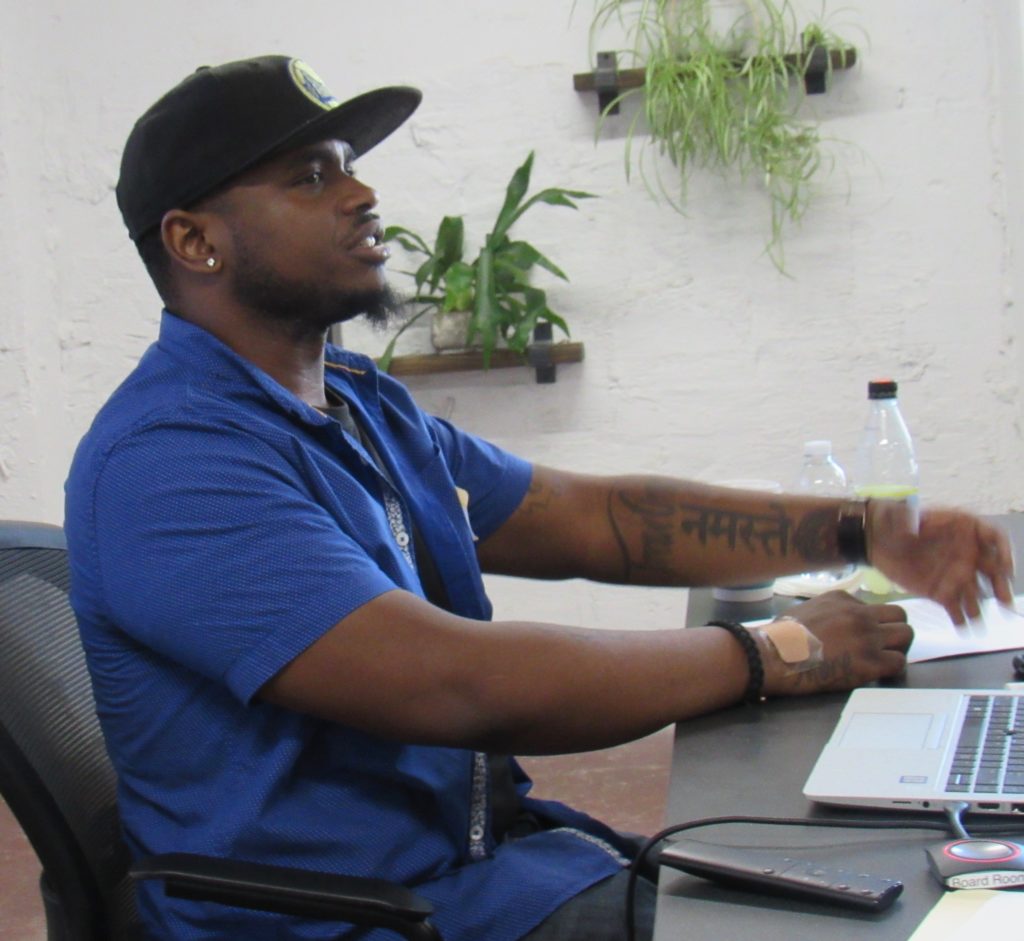
Jonah Mixon-Webster presenting on “Art Activism and Eco-Poetics” at the Flint Festival of Writers (Photo by Harold C. Ford)
Jonah Mixon-Webster
No matter his self-described tough childhood (“I was like an alien outcast.”), or his majority-minority status (“The majority of times I have read from SteroTYPE has been in front of a predominantly white audience and it’s a very black book,” he said), Mixon-Webster’s literary persona bursts with confidence.
His advice to festival-goers who would aspire to be writers: “Don’t capitulate to the press. That’s your work. Your mindset should be, ‘You’re lucky to have my work.’”
Mixon-Webster’s book of gritty, race-conscious poetry, StereoTYPE, is collecting awards that include the 2017 Sawtooth Poetry Prize and the PEN/Osterweil Award for Poetry. For the reader, the words from StereoTYPE jump off the page, such as those that begin “Black Martyrdom No 6: Litany of the Spectacle”:
“Come guillotine. Come gallows. Come gas-soaked pyre. Come charred jaw. Come hot spike. Come hoary beast. Come ardent hunger. Come garrote wire. Come death wizard. Come adze. Come axe. Come taut rope. Come head knot, neck kink…”
But his the grit and edge are enhanced when Mixon-Webster recites the poetry himself as can be witnessed via YouTube during his 2018 performance at the Center for African Poetry and Poetics.
At his Flint Festival of Writers workshop, titled “Art Activism and Ecopoetics,” Mixon-Webster read “Incubation.” It takes the reader/listener from the repetitive and nightmarish sound of a blaring siren in his Flint neighborhood in 2014 to a dystopian street scene in Flint in 2016. The final two verses:
“I return to the city for the first time/since the story surfaced. Riding through the hood,/crossing at the corner of Pierson and Dupont,/stands a string of neon stanchions,/military servicemen, a gaggle of palettes,/a gaggle of bottled waters wishing us well.
My boy posts a picture of his back/bubbling with fissures in an even spread—/having bathed in the city’s northeast waters,/the contagion carries itself into the host,/bearing a witness to a feast of skin/and other soft metals.”
The seeds for StereoTYPE were planted during his formative years on the north side of Flint. The project was brought to fruition and publication by the Flint water crisis and the pain he experienced having to witness, from Illinois, his family enduring the crisis.
“That pain still haunts (me) to this day,” he lamented. “It’s ironic that we live in the biggest center of world productivity and we’re having a third-world problem,” he said.
Mixon-Webster encouraged his approximate 30 workshop attendees to observe their environment and artistically represent their experiences through multiple media—photography, film, and the written and spoken word…in a more immersive experience. “The human body has multiple senses,” he said. “I hope everybody in this room can find a way to use their voice.”
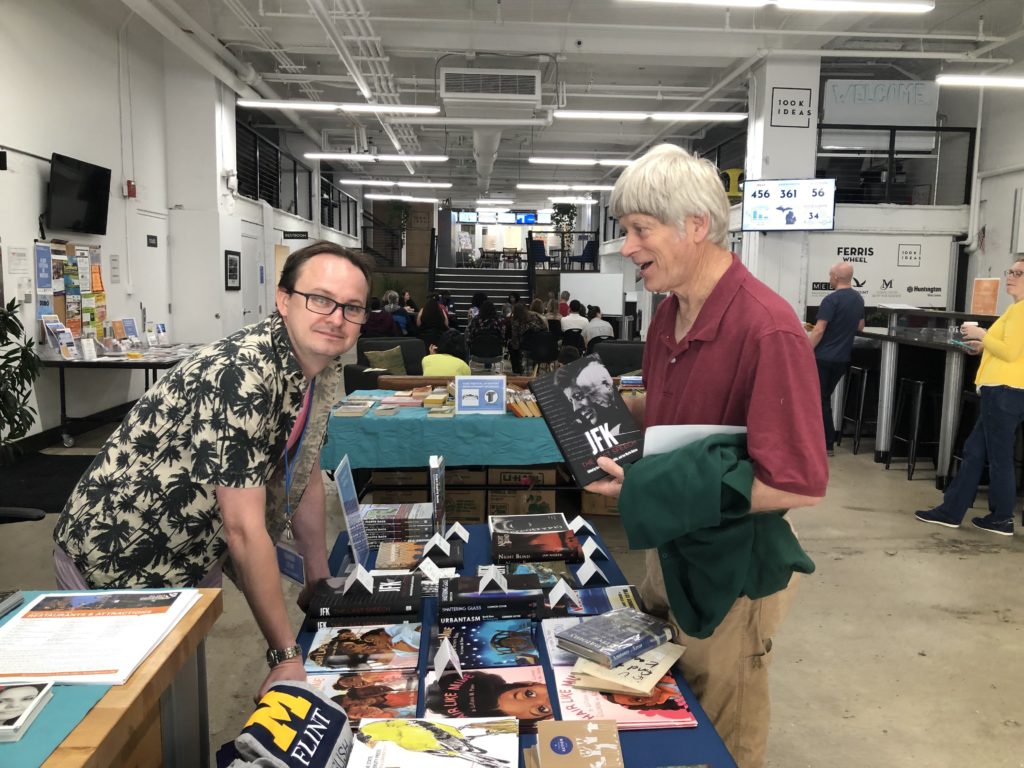
Festival co-founder and author Connor Coyne (left) with festival goer, writer and musician Tom Allen (Photo by Jan Worth-Nelson)
Commonalities:
Though surely individuals, all four writers possessed commonalities other than their chosen craft, ties to Flint, and racial themes that permeate their work. Most important, perhaps, is that all were inspired to become writers by influential educators.
“It started in elementary school,” said Pauli. “I had a vision as a kid of being a creative writer.”
Campbell and Mixon-Webster were inspired by high school teachers. “Mrs. Abrams developed an appetite for reading fiction (at Flint Southwestern),” Campbell recollected. “I came to the realization that there was something about the process of writing that really excites me.”
“It all started here in Flint,” said Mixon-Webster. He cited Christine Taylor’s sophomore English class at Flint Northern. “It bred me as a writer.”
Both Mixon-Webster and Perry were encouraged by professors at Eastern Michigan University. “EMU has a world-class program,” Mixon-Webster proclaimed. “They introduced me to all kinds of writing.”
Perry noted the influence of EMU’s Melvin Peters who advised her to pursue writing. “When you write, you get so excited,” he said.
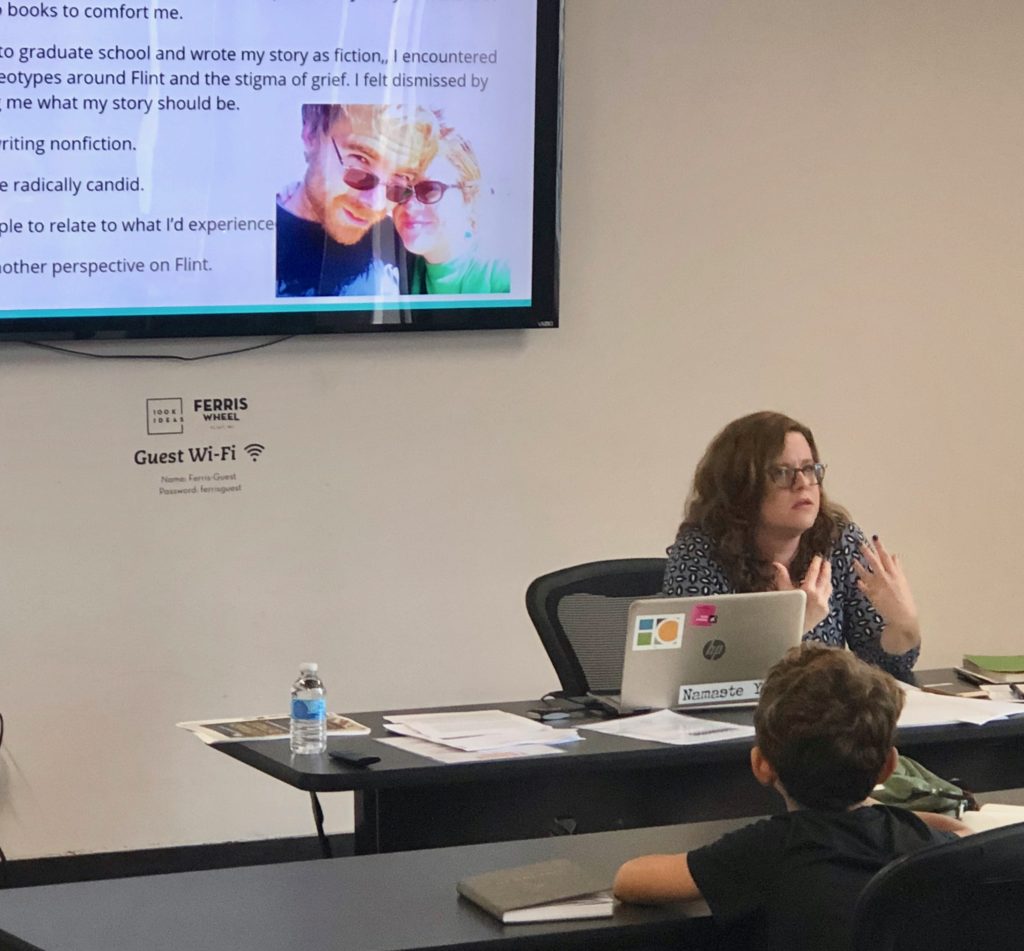
Fiction writer, essayist and teacher Kelsey Ronan describes how her life was changed and her writing shaped following the death of her longtime partner, Brian. (Photo by Jan Worth-Nelson)
The Flint Festival of Writers was sponsored by the Downtown Development Authority, East Village Magazine, Gothic Funk Press, PEN America, and the UM – Flint English Department. Committee members were Bob Campbell, Sarah Carson, Connor Coyne, Katie Curnow, James Schirmer, and Jan Worth-Nelson.
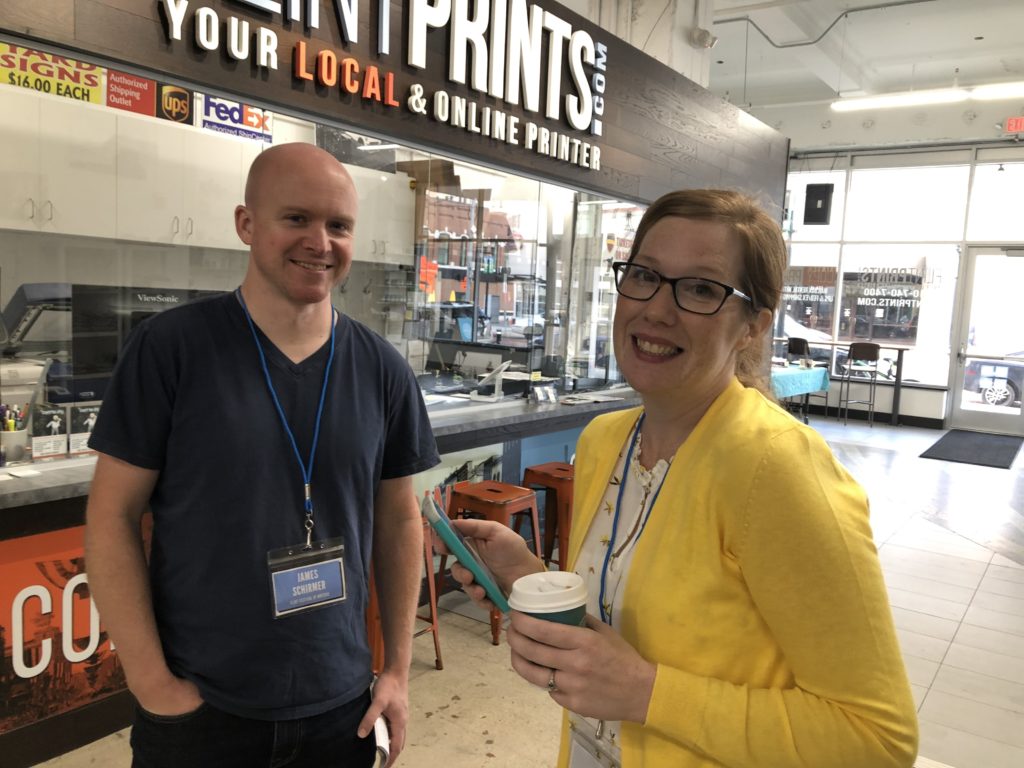
Festival committee members James Schirmer and Katie Curnow (Photo by Jan Worth-Nelson)
Banner Photo: Audience for LaTashia Perry’s culminating conversation at the Flint Festival of Writers. Reviewer Ford is in the pink shirt at left. (Photo by Jan Worth-Nelson)
EVM Staff Writer Harold C. Ford can be reached at hcford1185@gmail.com



You must be logged in to post a comment.